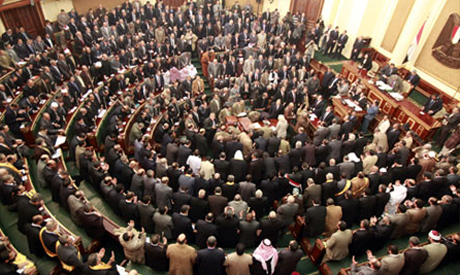 In a statement published Sunday, the Union of Egyptian Writers strongly condemned the methods use to determine the constituent assembly, which saw 50 per cent of the seats chosen from the Islamist-dominated People's Assembly and Shura Council and 50 per cent chosen from outside parliament.
In a statement published Sunday, the Union of Egyptian Writers strongly condemned the methods use to determine the constituent assembly, which saw 50 per cent of the seats chosen from the Islamist-dominated People's Assembly and Shura Council and 50 per cent chosen from outside parliament.
Union of Egyptian writers condemns Constituent Assembly
By-Ahram
Home News
00:03
Wednesday ,28 March 2012

The union had earlier announced its rejection of this system instead demanding that the unions, syndicates and other civil society organisations nominate representatives which Members of Parliament (MP) would then choose from. They referred to the Supreme Council of the Armed Forces (SCAF) authored Constitutional Declaration, which was approved in a March 2011 referendum, that gave MPs the right to elect but not nominate members.
The union had proposed 10 names for the assembly list which included renowned Egyptian intellectuals. However, the document was discarded by parliament. The current assembly doesn't include any members of the Union of Egyptian Writers, even among the substitutes.
Egyptian writers warned that the coming phase and the new constitution presents one of the worst crises to face the ongoing revolution.
Speaking to Ahram Online on Sunday, Egyptian novelist Gamal El-Ghitany anticipated the outcome because the selection of the committee was controlled by a Muslim Brotherhood dominated parliament that, he said, stands against writers and literature.
El-Ghitany added that he was surprised that the liberal factions did not boycott the nominations considering the members were chosen under such "rigged" circumstances. He explained that the academic community is fragmented and so there isn't a cohesive intellectual movement against the rising Brotherhood.
Nevertheless, El-Ghitany added that “Egypt will not become an Islamic country", trusting that Egyptians will reject such a result but the future is dim, he concluded.
Writer and critic Mahmoud El-Wardani emphasised that it was not just intellectuals but other key groups who were excluded as well and called on non-Islamists to withdraw their names from the assembly. He agreed with El-Ghitany that it is expected given that the Brotherhood's political wing the Freedom and Justice Party and the Salafist Nour Party, who hold the majority in parliament, would not risk opposition in the form of liberal-thinking intellectuals.
Mekkawi Said saw the failure to include academics as an indication that Egypt is in a worse situation now than it was under the previous regime's ruling National Democratic Party, that used to include a few ineffective intellectuals to avoid being labeled "exclusive."
He predicted that this exclusion will affect the success of the ongoing revolution as it will reduce people’s "consciousness." For Said, the constitution will not last long as it is built on shaky grounds because it has left out so many segments of society.
A presence of academics in the constituent assembly would not have made a difference, lawyer and writer Ahmed Zaghloul El-Shaity said to Ahram Online. This is because, he explained, the constitutional battle has already been settled in favour of the current regime: an unofficial coalition of the ruling military council, Islamists and ex-members of the Mubarak administration. El-Shaity hopes the revolution will learn its lessons adding “Egypt’s constitution is in the streets not in the parliament."
Fares Khedr, member of the Egyptian Writers Union, affirmed to Ahram Online that the presence of intellectuals is essential in such an assembly, as they represent the conscience of the nation.
Khedr condemned the way the list of nominees for the constituent assembly was submitted to parliament as there was no public discussion about the names, adding that the union includes many lawyers of better expertise than those included on the list. The names, he said, were chosen on the basis of fame. "We have idiots for politicians that do not read daily newspapers," Khedr concluded, "If these people are drafting our constitution, say goodbye to Egypt."


